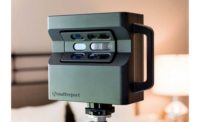Getting the most out of point-cloud jobsite scans is a perennial issue, and Bechtel is looking to a small startup for answers. The contractor has announced that it will be using point-cloud analysis software from Oakland, Calif.-based SKUR, which can rapidly compare scanned site data against a project’s entire BIM documentation.
“The SKUR As-Built Data Platform identifies potential, relevant variance issues early in the process,” said Bechtel CIO David Wilson in a press statement. Bechtel plans to use the software in its oil-and-gas operations and other industrial projects.
“Our system can consume huge amounts of data from the design model,” SKUR CEO Adam Cohen told ENR. “We’re agnostic on the modeling environment and scanning technology, but right now LiDAR provides the highest-accuracy point clouds.” SKUR’s cloud-based software measures the project’s 3D model against the point-cloud data scanned at the site, marking on a heat map individual elements that deviate from the design. “What you’re getting back is an augmented design file,” says Cohen. “You get stoplight colors on user tolerances and … a PDF report for every single object to show how it is performing relative to the rest of the model.”
Running trials on small projects in California, SKUR has seen benefits in ensuring that large, prefabricated components match the as-built site conditions. “It’s really about avoiding critical-path delays, and we’re looking to surface those problems before they become an issue,” says Cohen.
SKUR also has developed SKURBOT, a prototype autonomous LiDAR scanner. While they are not a robotics firm, Cohen thinks SKURBOT will convince contractors how easy it is to collect point-cloud data on site.





Post a comment to this article
Report Abusive Comment